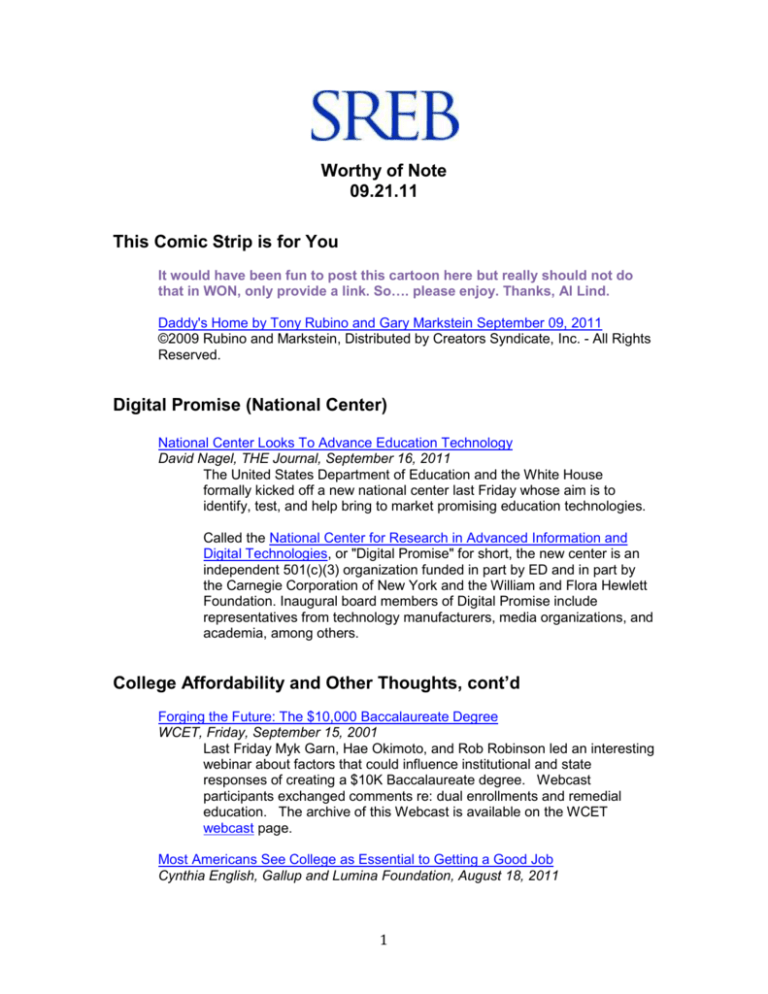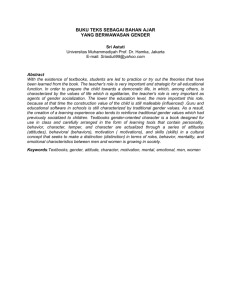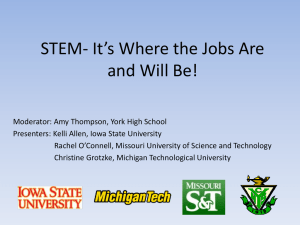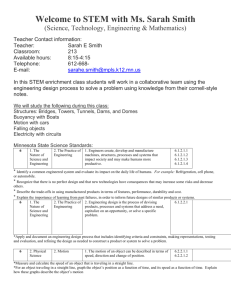
Worthy of Note
09.21.11
This Comic Strip is for You
It would have been fun to post this cartoon here but really should not do
that in WON, only provide a link. So…. please enjoy. Thanks, Al Lind.
Daddy's Home by Tony Rubino and Gary Markstein September 09, 2011
©2009 Rubino and Markstein, Distributed by Creators Syndicate, Inc. - All Rights
Reserved.
Digital Promise (National Center)
National Center Looks To Advance Education Technology
David Nagel, THE Journal, September 16, 2011
The United States Department of Education and the White House
formally kicked off a new national center last Friday whose aim is to
identify, test, and help bring to market promising education technologies.
Called the National Center for Research in Advanced Information and
Digital Technologies, or "Digital Promise" for short, the new center is an
independent 501(c)(3) organization funded in part by ED and in part by
the Carnegie Corporation of New York and the William and Flora Hewlett
Foundation. Inaugural board members of Digital Promise include
representatives from technology manufacturers, media organizations, and
academia, among others.
College Affordability and Other Thoughts, cont’d
Forging the Future: The $10,000 Baccalaureate Degree
WCET, Friday, September 15, 2001
Last Friday Myk Garn, Hae Okimoto, and Rob Robinson led an interesting
webinar about factors that could influence institutional and state
responses of creating a $10K Baccalaureate degree. Webcast
participants exchanged comments re: dual enrollments and remedial
education. The archive of this Webcast is available on the WCET
webcast page.
Most Americans See College as Essential to Getting a Good Job
Cynthia English, Gallup and Lumina Foundation, August 18, 2011
1
WASHINGTON, D.C. -- Most Americans see a college degree as a
necessary step toward attaining quality employment. Nearly 7 in 10 U.S.
adults (69%) strongly agree or agree that having a college degree is
essential for getting a good job in this country, according to a recent study
by Gallup and Lumina Foundation for Education.
Featured in the Tomorrow’s College Series (Lumina Foundation), Emily
Hanford makes this observation in Some College, No Degree: More
people are going to college than ever before. But in the United States,
about half the people who start don't finish. There are 37 million
Americans with some college credits but no degree - more than 20
percent of the working-age population. In an economy that increasingly
demands workers with knowledge and skills, many college dropouts are
being left behind.
The College Payoff (Education, Occupations, Lifetime Earnings)
Center on Education and the Workforce, Georgetown University, August 5, 2011
College pays off over a lifetime, but occupation, gender, race and
ethnicity matter too. The report (download) also details how some
workers can make more than their better-educated counterparts. Read
comments in The Daily Beast
Help Wanted: Projections of Jobs and Education Requirements Through 2018
Anthony P. Carnevale, Nicole Smith and Jeff Strohl,
Center on Education and the Workforce, Georgetown University, June 15, 2010
Landmark report shows where the jobs will be, by education level,
occupation and industry through 2018, and how postsecondary education
is increasingly essential to middle class earnings.
Room for Debate; $10,000 for a Degree
New York Times, September 5, 2011
Read the discussion as twelve well-qualified people debate the $10,000
degree.
A Descriptive Look at College Enrollment and Degree Completion of Baltimore
City Graduates
Rachel E. Durham and Erik Westlund, Baltimore Education Research
Consortium (BERC) August 2011
A new report (download) (A Descriptive Look at College Enrollment and
Degree Completion of Baltimore City Graduates) by researchers at Johns
Hopkins University has documented a shift in Baltimore's high school
graduates attending college: In the last four years, the percentage starting
at two-year colleges, as opposed to four-year colleges, rose by 12
percentage points, to 52 percent. The Baltimore Sun (Erica L. Green,
September 11, 2011) reported that officials are concerned about the trend
because only 5.8 percent of those who start at a two-year college earn a
degree in six years -- compared with 34 percent who start at four-yearcolleges.
STEM
2
Access STEM
The National Science Foundation funds the Alliance for Students with
Disabilities in Science, Technology, Engineering, and Mathematics
(STEM), which began in 2002 (award #HRD-0227995 and HRD0833504). The purpose of AccessSTEM is to increase the participation of
people with disabilities in STEM careers. Outreach and dissemination
efforts extend nationwide. AccessSTEM joins other National Science
Foundation Alliances for Persons with Disabilities in STEM, AASD-STEM,
EAST, KC-BANCS, Midwest, MIND, OSAA, Pacific, and Reaching the
Pinnacle to develop resources and share promising practices.
STEM Resources — Tennessee
A resource provided by the Tennessee Department of Education,
STEMresources.com offers teachers quick and easy access to standardsbased instructional tools, quality curriculum materials, and the latest
Internet materials.
Panel: STEM Education Crisis Stems from Unsupported Teachers
Meris Stansbury, eSchool News, September 14, 2011
According to a panel of science, technology, engineering, and math
(STEM) education experts and industry leaders, the United States is still
falling short of producing the number of STEM graduates needed to fill
21st-century jobs — and panelists said the problem can be traced to a
lack of support for teachers.
National Association for Gifted Children - STEM
From The Scout Report, Copyright Internet Scout Project 1994-2011.
September 16, 2011
The aim of the National Association for Gifted Children (NAGC),
according to its website, is to "train teachers, encourage parents and
educate administrators and policymakers on how to develop and support
gifted children." Their site addresses the recent federal emphasis on
STEM, and how it is related to work with gifted children. Visitors will learn
in the first paragraph of the section entitled "Gifted Children and STEM",
the difficulties that may be faced when encouraging STEM careers
among gifted children. The site notes that multiple abilities and a "wide
range of interests...make[s] selecting a career difficult" for gifted children.
Visitors will see, however, that the NAGC does have suggestions on how
to help gifted students excel in the STEM subjects. There are links to
research on pull-out programs, public math-science high schools, and
teacher training programs designed to recognize giftedness. Also, users
should look at the very bottom of the STEM page for a link to a fact sheet
on STEM and gifted education. This particular fact sheet notes the lack of
progress that has been made in high-potential education, which ultimately
increases the dropout rates of gifted students in such programs.
Alice
From The Scout Report, Copyright Internet Scout Project 1994-2011.
September 16, 2011
3
This website makes the "T" (Technology) in STEM come to life for
students, and hopefully it will spark their desire to work in computer
science. Alice was produced at Carnegie-Mellon University, and it is a
free educational software program that teaches computer programming in
a 3-D environment. The website states that it tries to make a student's
first attempt at programming less frustrating, and the end result is an
animation to tell a story, play an interactive game or make a video.
Visitors should check out the "Teaching" tab, which includes "Instructional
Materials", "Tutorials" and "Textbooks". There are almost a dozen
textbooks on using Alice, several of which were co-authored by a wellknown computer scientist visitors may remember - the late Randy
Pausch. Visitors can sign up for a periodic Alice newsletter, under the
"Teaching" or "Community" tab. The "Publications" tab has five papers
that visitors can download as PDFs, including "Alice: Easy-to-Learn 3D
Scripting for Novices" and "Evaluating the Effectiveness of a New
Instructional Approach."
Resources
Basic Search Education Lesson Plans
Google
Web search can be a remarkable research tool for students - and we've
heard from educators that they could use some help to teach better
search skills in their classroom.
Google Certified Teachers and the Search Education team to help you do
just that developed these Search Education lessons. The lessons are
short, modular and not specific to any discipline so you can mix and
match to what best fits the needs of your classroom. Additionally, all
lessons come with a companion set of slides (and some with additional
resources) to help you guide your in-class discussions. They are all under
Creative Commons Attribution Share-alike, so feel free to adapt them and
use them as you see fit! Just please link back to this page.
Whyville
Whyville is a virtual world geared for teen and pre-teen girls and boys.
Whyville was one of the first virtual worlds where game play was based
on an internal virtual currency, and it was one of the first sites to
emphasize user-created content.
Whyville's millions of registered "citizens" come from all over to learn,
create, and have fun together. Whyville is their world. Whyville has places
to go, things to do, and of course, people to see. Whyville has its own
newspaper, its own Senators, its own beach, museum, City Hall and town
square, its own suburbia, and even its own economy - citizens earn
"clams" by playing educational games. And much, much, much more!
Read about Whyville on Wikipedia; it has an extensive list of sponsors.
A Catalog of iPad Apps for Teachers and Students
Vicki Windman, Tech & Learning, n.d.
4
“Fourteen of us–special education teachers, school psychologists, speech
therapists, and other educators–recently spent six hours brainstorming
with the goal of producing a starter iPad app catalog for teachers and
students in our district, and beyond. Thanks to my colleagues for helping
the district pioneer through new territory!”
QR Codes in the Classroom
Bridget McRae, THE Journal, August 31, 2011
Wyoming science teacher London Jenks not only allows mobile
technologies in his classroom, but he's also learned how to maximize
them as educational tools, tapping the devices for assessments,
research, and even student scavenger hunts using QR codes.
Top Documentary Films (free)
TDF offers full watchable documentaries and information on
documentaries by quoting reviews from trusted sources. In case you
decide to buy your favorite documentary film, or you want to get some
more information on some of the docs there is a store available for that.
Documentaries are classified in categories and you can easily find what
you are looking for. The site is in open form and it is allowing readers to
add comments about documentary films they like or dislike. Check out the
complete list.
Social Media
The Growth of Social Media: An Infographic
Jenise Uehara Henrikson, Search Engine Journal, August 30, 2011
“If Facebook were a country it would be the third largest country behind
China and India.” A new study suggests half of all American adults are
now on social networks. In fact, out of American adults who use the
Internet, Pew found that nearly two-thirds use social media sites like
Facebook or Twitter. But take a look at the steep curve of the user growth
rate in all age ranges and demographics, and the continuing
pervasiveness of social networking into every facet of work, play and life
in general. It’s hard to argue that social media hasn’t changed forever
how we interact and connect online.
Edmodo
Edmodo is a free and secure social learning network for teachers,
students and schools. Edmodo provides classrooms a safe and easy way
to connect and collaborate, offering a real-time platform to exchange
ideas, share content, and access homework, grades and school notices.
Accessible online and from any mobile device via free smart phone
applications, Edmodo has grown from a teacher tool into a district-wide
resource as word of the free online service spreads through schools
around the world.
Here’s a quick explanation via You Tube of why to use Edmodo in the
classroom. And here’s an app designed for using Edmodo on both iPhone
and iPad.
5
In Honor of Teachers
In Honor of Teachers
Charles M Blow, New York Times, September 2, 2011
This opinion column celebrates teachers, and they are much maligned
today. If there was a teacher that changed your life, or even there was
not, this is a stunning affirmation.
American Teacher; a Documentary
A film by Vanessa Roth, First Run Features, 2011 (81 minutes)
American Teacher is the feature-length documentary created and
produced by Vanessa Roth, et al. The film includes a musical score by
Thao Nguyen and is narrated by Matt Damon. The film chronicles the
stories of four teachers living and working in disparate urban and rural
areas of the country. Their stories are told through a mixture of footage
and interviews with students, families, and colleagues, as well as the
teachers themselves. By following these teachers as they reach different
milestones in their careers, our film tells the deeper story of the teaching
profession in America today.
While all research proves that teachers are the most important schoolbased factor in a child’s future success, almost two-thirds of our nation’s
teachers divide their time between teaching and second jobs. American
Teacher goes further than simply stating that our system is broken, by
shining on a light on various positive reform efforts in the country. Looking
at schools and districts paving the way for change, the film aims to
demonstrate that by making the teaching profession the financially
attractive, prestigious, and competitive profession it deserves to be, our
country can and will build a dedicated force of teachers, who not only
inspire and challenge students to live up to their potential, but who grow
in their profession to shape whole communities.
And perhaps you will recall this book published in 2005.
Teachers Have It Easy: The Big Sacrifices and Small Salaries of America’s
Teachers
Daniel Moulthrop, Ninive Calegari and Dave Eggers, Washington Post Book
World, 2005
With a look at the problems of recruitment and retention, the myths of
short workdays and endless summer vacations, the realities of the work
week, and shocking examples of how society views America’s teachers,
Teachers Have It Easy explores the best ways to improve public
education and transform our schools.
In Defense of Public Education
Heather Clayton Staker, Stanford Social Innovation Review, August 30, 2011
(You may know Heather Staker as a Senior Research Fellow at
Innosight.) With conservatives refusing tax increases and liberals
resisting entitlement cuts, the discretionary spending bucket is the easiest
6
place for both parties to find a palliative for the nation’s maxed-out deficit
headache.
Thus, funding for public education is vulnerable right now—and the
institution itself needs defenders. As one pushing for innovation in
education, I have come under fire by skeptics who think that by calling for
innovation, I intend for the system’s gradual spinoff out of the public
sphere. True, I hope for a transformation of public education, but my
desire is only for its improvement, not its demise.
Why is public education in America important? She lists five key reasons.
Online Learning
Online Education
U. S. News Education
This is a collection of feature articles in U. S. News all related to higher
education online education.
College Rankings, 2012
U. S. News Education
Find top online programs on the bottom right side of the page. (I notice
some obvious omissions. For example, Florida State University offers
several Masters and Specialists degrees available completely online that I
am sure would meet the criteria. There probably are many others.)
The Digital Revolution and Higher Education
College Presidents, Public Differ on Value of Online Learning
Kim Parker, Amanda Lenhart and Kathleen Moore, Pew Research Center,
August 28, 2011
This report is based on findings from a pair of Pew Research Center
surveys conducted in spring 2011. One is a telephone survey of a
nationally representative sample of 2,142 adults ages 18 and older. The
other is an online survey, done in association with the Chronicle of Higher
Education, among the presidents of 1,055 two-year and four-year private,
public, and for-profit colleges and universities. A summary of the key
findings is featured.
UC Takes First Steps into Online Education
Lisa Krieger, Oakland Tribune, August 18,2011
Going online to get a college degree has been championed as a costeffective way to educate the masses and challenged as a cheapening of
academia. Now, the online classroom is coming to the vaunted UC
system, making it the nation's first top-tier university to offer
undergraduate credit for cyber studies.
Online Kindergarten Courses? Volusia, Flagler School Choices Keep Growing
Linda Trimble, Daytona Beach News Journal, August 21, 2011
Take a look at how online learning from kindergarten through high school
is unfolding in one county (area) in central Florida.
7
Online as Last Resort
Dean Dad August 31, 2011
Some colleges employ the use of online courses as a last resort for overenrolled sections.
Smart Phones and Other Digital Media
Smart Phones Driving Lecture Capture Growth
Dennis Carter, eCampus News, July 20, 2011
Watching and re-watching lectures online has long been among college
students’ favorite educational technology, and making those recorded
class sessions available via smart phone has led to a jump in lecture
views, according to research from Tegrity, a leading maker of lecturecapture systems.
Blackberrys and Beyond: Technology and Global Higher Education
Nigel Thrift, The Chronicle, August 22, 2011
“…Research such as Rich Ling’s New Tech, New Ties or, more recently,
Daniel Miller’s Tales from Facebook show that the new technologies can
tend to narrow and reinforce social interaction rather than broadening it:
people often tend to stick with their own kind, with ever-widening circles of
people who agree with them. I worry that this effect might infect
researchers who are increasingly able, through these devices combined
with blogs, Facebook, Twitter, and the like, to live in even more
specialised worlds of research and gossip, even though they may feel like
cosmopolitans.”
Learning: Is There an App for That?
Cynthia Chiong & Carly Shuler, The Joan Ganz Cooney Center, November 2010
This report (download) focuses on how new forms of digital media are
influencing very young children and their families in the United States and
how we can deploy smart mobile devices and applications-apps, for short
— in particular, to help advance their education. It does so in three parts:
Part One discusses new trends in smart mobile devices, specifically the
pass-back effect, which is when an adult passes his or her own device to
a child. Part Two presents the results of three new studies that were
undertaken to explore the feasibility and effectiveness of using apps to
promote learning among preschool- and early-elementary-aged children.
Though designed to complement one another, each study approached
mobile learning from a different angle. Finally, Part Three discusses the
implications these findings have for industry, education, and research.
Textbooks and Such
Khan Academy Integrates With Digital Textbooks
Sarah Kessler, Mashable, August 22, 2011
8
The 12-minute video lectures that Bill Gates has called “the start of a
revolution” will now be linked with the material in some digital textbooks.
Etextbook maker Kno announced Monday that it will integrate thousands
of tutorial videos from Khan Academy into its books.
Kno will be linking them to its books through a new “smart links” feature.
When students click on a Khan Academy tutorial from a new tab on one
of Kno’s digital pages, Khan’s explanation of that topic plays within the
book.
Open Textbooks
The Student PIRGS
This resource is a collection of basic information and links to other
resources on open textbooks. We are always looking for additions, so
please feel free to email us with recommendations. (See the next item.)
The Bucks Guide to Finding Cheap Textbooks: 3rd Edition
Tara Siegel Bernard, New York Times Blog Bucks
Exorbitant college textbook prices have given rise to a “textbook
rebellion,” which may be coming to a campus near you.
A coalition of students, parents, professors and organizations including
the Student Public Interest Research Groups, have banded together to
promote more affordable alternatives to the $200 textbook — an amount
that is not uncommon for science, economics, accounting and math
students, among other pricey majors.
Among other things, the coalition also hopes to raise awareness about
cheaper alternatives like “open textbooks,” which are offered under a
license that allows you to read free online, or to obtain a print copy for a
fraction of the cost of traditional hard-copy competitors.
Many U.S. Schools Adding iPads, Trimming Textbooks
Stephanie Reitz, Huff Post Education, September 3, 2011
The rush is on. Apple officials say they know of more than 600 districts
that have launched what are called "one-to-one" programs, in which at
least one classroom of students is getting iPads for each student to use
throughout the school day. And the trend has not been limited to wealthy
suburban districts. New York City, Chicago and many other urban districts
also are buying large numbers of iPads.
Many benefits are claimed. They include interactive programs to
demonstrate problem-solving in math, scratchpad features for note-taking
and bookmarking, the ability to immediately send quizzes and homework
to teachers, and the chance to view videos or tutorials on everything from
important historical events to learning foreign languages.
They're especially popular in special education services, for children with
autism spectrum disorders and learning disabilities, and for those who
learn best when something is explained with visual images, not just
through talking.
9
Some advocates also say the interactive nature of learning on an iPad
comes naturally to many of today's students, who've grown up with
electronic devices as part of their everyday world.
Open Textbooks: Computer Science
From The Scout Report, Copyright Internet Scout Project 1994-2011. September
16, 2011
The open textbook movement is in full flower, and curious parties can find
topics covering horticulture, engineering, and philosophy scattered across
the Internet. This particular website brings together over three dozen
college level textbooks from the field of computer science. The site
includes computer science textbooks from the Open University in the
United Kingdom, the University of Oregon, and a number of other
universities. The titles are arranged alphabetically, and they run the
gamut from "Accessibility of eLearning" to "XML-Managing Data
Exchange". Visitors will note that while not all of the textbooks have been
vetted by professional reviewers, those that have been reviewed have a
"*" symbol next to their name.
Broadband Expansion
Expanding Access, One College at a Time
Tabitha Whissemore, Community College Times, August 22, 2011
The Arkansas Association for Two-Year Colleges (AATYC) received $43
million of a $102 million federal grant to expand broadband access in
Arkansas. It has partnered with the University of Arkansas for Medical
(UAMS) on the project, which has a new name — Arkansas e-Link. The
plan is to have all the state’s community colleges hooked to high-speed
broadband by August 2013.
Up to the Challenge: The Role of Career and Technical Education and 21st
Century Skills in College and Career Readiness @ OK Career Tech
Kerry Eades, Oklahoma Career Tech, September 20, 2011
Last week the Ed Tech Cooperative held its annual meeting. Tim Magner,
Executive Director for The Partnership for 21st Century Skills. was a
presenter, and while career education was not his topic, Kerry Eades
from Oklahoma spoke with Tim, and he pointed up this publication, Up to
the Challenge: The Role of Career and Technical Education and 21st
Century Skills in College and Career Readiness. Kerry has highlighted
this publication in this week’s wiki.
State Regulations for Distance Education
Cutting Their Losses
Libby A. Nelson, Inside Higher Ed, August 18, 2011
10
Colleges trying to obtain permission from every state in which they enroll
students, as required by a new Education Department rule, have
confronted a patchwork of widely different regulations. Fees can range
from none at all to thousands of dollars per course or degree program.
Requirements range from lax (the institution must be accredited) to
stringent (facing a possible site inspection -- and paying all of the
inspectors’ travel costs).
In response to the rule, some institutions will abandon some states
altogether, a survey released by the University Professional & Continuing
Education Association (UPCEA) and the WICHE Cooperative for
Educational Technologies (WCET) has found. Many of those colleges
cited Massachusetts, Minnesota and Arkansas as places where they will
no longer enroll students. At least 19,000 students total will be turned
away, the colleges who responded to the relevant survey questions
estimated.
Assessment
Internet Resources for Higher Education Outcomes Assessment
Copyright © 1995-2011 Ephraim I. Schechter, All Rights Reserved
About this list:
Ephraim Schechter first posted the list in 1995 at the University of
Colorado at Boulder. Later, it lived at the University of North Carolina
system office and at North Carolina State University. NC State kindly
continues to host it. The list currently has over 1,200 links, including over
400 college and university assessment sites.
Education Reform or What Will the Future Look Like?
House Approves First Education Reform Legislation
H.R. 2218 Will Facilitate Development of High-Quality Charter Schools
WASHINGTON, D.C. | September 13, 2011
The U.S. House of Representatives today approved the Education and
the Workforce Committee’s first piece of education reform legislation.
Introduced by Subcommittee on Early Childhood, Elementary, and
Secondary Education Chairman Duncan Hunter (R-CA), the Empowering
Parents through Quality Charter Schools Act (H.R. 2218) passed with
strong bipartisan support in a vote of 365 to 54.
What Will School Look Like in 10 Years?
Joshua Brustein, Bits Blog, New York Times, September 3, 2011
Computers, electronic whiteboards and other interactive technologies are
fundamentally changing American education. That is the view of the
experts whom The Times spoke with about what the classroom will look
like 10 years from now. Listen to excerpts from Karen Cator, Tom Vander
Ark, Larry Cuban and others. Reference is made to the article below….
In Classroom of Future, Stagnant Scores
11
Matt Richtel, New York Times, September 3, 2011
This is the first article in the Grading the Digital School Series.
The pressure to push technology into the classroom without proof of its
value has deep roots. Here’s a look at a dynamic 21st century classroom
in Arizona where hope and enthusiasm are soaring. But not test scores.
“The data [to gauge the educational value of expensive technology
investments] is pretty weak. It’s very difficult when we’re pressed to come
up with convincing data,” said Tom Vander Ark, the former executive
director for education at the Bill and Melinda Gates Foundation and an
investor in educational technology companies. When it comes to showing
results, he said, “We better put up or shut up.”
Professional Development
Alabama Learning Exchange Helps Teachers Create Project-Based Lessons
Tanya Roscorla, Converge, September 13, 2011
Through a statewide online platform, Alabama educators share lessons,
find digital resources and teach each other. And on Sept. 1, the Alabama
Learning Exchange (ALEX) won a Best of the Web Award from the
Center for Digital Education. The department added a new professional
learning community section called ALEXville. "The professional
development piece we have found is critical to implementing these
resources in the classroom because it gives them ideas." Read more…..
Is There Anything to Learn Here?
For-Profit Schools: They Get IT
John K. Waters, Campus Technology, September 01, 2011
Traditional colleges may think they have nothing to learn from for-profits,
but when it comes to advanced use of technology, look no further.
Pearson and Connections
Pearson Acquires Connections Education
Pearson, September 15, 2011.
Pearson, the world’s leading learning company, is announcing today the
acquisition of Connections Education from an investor group led by Apollo
Management, L.P. Read Michael Horn’s comments at Innosight.
12










